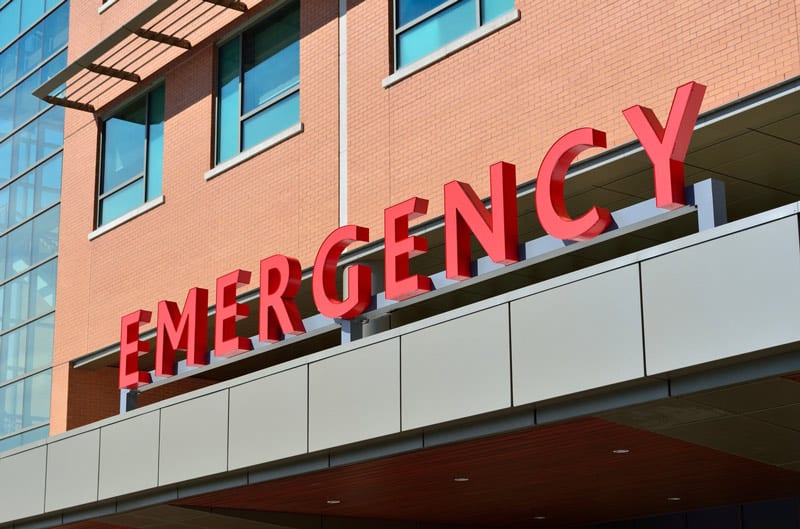For the ten millionth time, I recently ended up in the emergency department (ED) for shortness of breath, chest pains, and nausea. What I didn’t realize is that these symptoms are also symptoms of a panic attack or anxiety. Panic attacks can come on unexpectedly and manifest in physical symptoms. This is something that has finally dawned on me, and I’m determined to stop all the doctors’ and ED visits for this problem.
I have a history of running to doctors or even EDs when I don’t feel well. I have a slight heart condition that is not serious. It necessitates taking a few pills, a healthy diet, and exercise, all things that I do anyway. Sometimes though, and this has been going on for years, I will get chest pain or shortness of breath, panic, and rush off to the doctor or ED. Everything always turns out fine. I also have gone to doctors many times for other conditions. I am not sure why I always worry about my health, but I suppose awareness is the first step to recovery.
This last time I was in the ED, I was sent there by my doctor. It was not a pleasant experience. I was on a hard gurney for six hours until I got a hospital bed at 4:00 am. I kept staring at the clock, wondering if they were going to check in on me – When would I see the cardiologist? Could I get a snack? Etc., etc. Anxiety going overtime! And the hospital is not a great place for anxiety to fester! I even had to ask the staff to leave my door and curtain open, 1) because I am claustrophobic, and 2) I thought they’d forget about me if the door was closed.
Later, I found out I was in observation status, which means you are being billed as an outpatient and will not be admitted. Upon hearing this, I realized that I would be okay, and they would send me home again, like all of my other ED visits for years on end. This time, I really wanted to go home and could not wait to get out of the ED. My tailbone gets sore sometimes, and even the comfortable bed I ended up with was hitting it in the wrong spot, so I was miserable and a grumpy patient. This time, I vowed never to return for anxiety, as I had so many times before.
It wasn’t until the next day that I finally realized, after years of this happening repeatedly, what had been going on. I always get a call from a nurse at the insurance company after being in the ED. This time, our conversation was eye-opening for me. She wondered whether anything had triggered my anxiety this time. She suggested it might be because I had been bored lately. She said boredom could be a trigger for anxiety, which is something I was not aware of.
Many people have noticed for years that my anxiety causes me to run off to doctors. I think I was embarrassed to face anxiety in myself. I saw it as a weakness for some reason. I already deal with bipolar disorder. According to bphope.com, more than half of people who have bipolar disorder also have an anxiety disorder. So, having bipolar disorder, I didn’t want to face the fact that I have anxiety, too, even though it was obvious to others. But I do want to say that I know on a rational level that having a mental illness does not mean one is weak!
One thing that helps with my anxiety is a meditation app, Headspace, that I recently installed on my phone. I use the meditation app every day, but I am becoming aware that I get anxious about many things, not just my health. In the past, I had a lot of anxiety about finances. The anxiety just seems to shift from one thing to another.
So how do I get on the road to recovery from anxiety? As this is a fairly new realization for me, I’m going to work closely with my therapist to try to deal with it. Meditation, exercise, writing, and staying busy help, but I need to do more. I hope it doesn’t pop up in another form after I am no longer anxious about my health. But I will keep going! Recovery is always possible!
If you or someone you know experiences mental health issues, it is important to seek help from a qualified professional. Our Resource Specialist can help you find expert mental health resources to recover in your community. Contact us now for more information on this free service to our users.
About the Author: Kate Fennell has worked for the Connecticut Department of Mental Health and Addiction Services for almost 20 years. She is married and enjoys exercise, writing, friends, hiking, and her cat. Not so much cooking.
Image by Pixabay
The opinions and views expressed in any guest blog post do not necessarily reflect those of www.rtor.org or its sponsor, Laurel House, Inc. The author and www.rtor.org have no affiliations with any products or services mentioned in the article or linked to therein. Guest Authors may have affiliations to products mentioned or linked to in their author bios.
Recommended for You
- Why a Mental Health Retreat Can Transform Your Recovery Journey - December 11, 2025
- Laughter as Therapy: How Humor Supports Emotional Recovery - December 8, 2025
- When Teenage Stomach Pain Signals Anxiety: A Pediatric GI Doctor Explains - December 4, 2025





